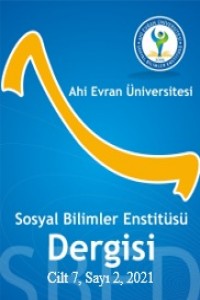Öz
Araştırma, pandemi sürecinde ebeveynlerin uzaktan eğitim deneyimlerinin incelenmesi amacıyla yapılmıştır. Araştırma nitel araştırma deseniyle oluşturulmuş ve görüşme tekniği kullanılarak gerçekleştirilmiştir. Araştırmanın çalışma grubuna çocuğu ilköğretime devam eden 21 ebeveyn katılmıştır. Araştırma verileri yapılandırılmış görüşme formu kullanılarak elde edilmiştir. Veriler, içerik analizi yöntemi kullanılarak analiz edilmiştir. Elde edilen sonuçlara göre araştırmaya katılan ebeveynlerin çoğunluğu okulların kapatılması kararını onaylamaktadır. Gün içerisinde ortalama 1-2 saat arasında çocuklarını desteklemektedir. Yeterli miktarda eğitim kaynağına sahiptir. Kapanma sürecinde okulun sağladığı destekten memnun veya çok memnundur. Uzaktan eğitim sürecinde teknik, sosyal, öğrenci merkezli ve eğitim merkezli zorluklar yaşamaktadırlar. Örgün eğitime geçilmesini istemektedirler ve öğretmenlerin süreçte anlayışlı davranarak destek olabileceklerini düşünmektedirler.
Kaynakça
- Beckman, K., Bennett, S., & Lockyer, L. (2019). Reproduction and transformation of students’ technology practice: The tale of two distinctive secondary student cases. British Journal of Educational Technology, 39, 346. https://doi.org/10.1111/bjet.12736
- Borup, J. (2016). Teacher perceptions of parental engagement at a cyber high school. Journal of Research in Technology in Education, 48(2), 67-83. https://doi.org/10.1080/15391523.2016.1146560
- Can, E. (2020). Coronavirüs (COVID-19) pandemisi ve pedagojik yansımaları: Türkiye’de açık ve uzaktan eğitim uygulamaları. Açıköğretim Uygulamaları ve Araştırmaları Dergisi, 6(2), 11-53.
- Chang, J. (2018). Influencing factors and coping strategies of students’ engagement in the context of ınternet education. 9th International Conference on Information Technology in Medicine and Education (ITME). Hangzhou, 517-520. doi: 10.1109/ITME.2018.00120
- Cohen, J., & Kupferschmidt, K. (2020). Countries test tactics in 'war' against COVID-19. Science, 367(6484), 1287-1288. https://doi.org/10.1126/science.367.6484.1287
- Cowling, B. J., Ali, S. T., Ng, T. W., Tsang, T. K., Li, J. C., Fong, M. W., Liao, Q., Kwan, M. Y. W., Lee, S. L., Chiu, S. S., Wu, J. T., Wu, P., & Leung, G. M. (2020). Impact assessment of non-pharmaceutical interventions against COVID-19 and influenza in Hong Kong: An observational study. MedRxiv. Advance online publication. The Lancet Public Health, 5(5), 279-288.https://doi.org/10.1101/2020.03.12.20034660
- Çiftçi, S., Taşkaya, S. M., & Alemdar, M. (2013). Sınıf öğretmenlerinin fatih projesine ilişkin görüşleri. İlköğretim Online, 12(1), 227-240.
- Daniel, J. (2020). Education and the COVID-19 pandemic, Propsects, 49(1), 91-96.
- Erol, M., & Erol, A. (2020). Koronavirüs pandemisi sürecinde ebeveynleri gözünden ilkokul öğrencileri. Milli Eğitim Dergisi, 49(1), 529-551.
- Goodall, J. (2016). Technology and school–home communication. International Journal of Pedagogies & Learning, 11, 118–131. https://doi.org/10.1080/22040552.2016.1227252
- Hollingworth, S., Mansaray, A., Allen, K., & Rose, A. (2011). Parents’ perspectives on technology and children’s learning in the home: Social class and the role of the habitus. Journal of Computer Assisted Learning, 27, 347–360. https://doi.org/10.1111/j.1365- 2729.2011.00431.x
- Huebner, E. S., Suldo, S. M., Valois, R. R., Darne, J. W. & Zullig, K. (2004). Brief multidimensional students’ life satisfaction scale: Sex, race, and grade effects for high school sample. Psychological Reports, 94(1), 351-356. https://doi.org/10.2466/PR0.94.1.351-356
- İnci Kuzu, Ç. (2020). COVID-19 pandemisi sürecinde uygulanan ilkokul uzaktan eğitim programı (EBA TV) ile ilgili veli görüşleri. Milli Eğitim Dergisi, 49(1), 505-527.
- Liu, F., Black, E., Algina, J., Cavanaugh, C., & Dawson, K. (2010). The validation of one parental involvement measurement in virtual schooling. Journal of Interactive Online Learning, 9(2), 105–132
- Makrooni, G. (2019). Being a first-generation migrant family student in Finland: Perceptions and experiences of the educational journey to higher education. Journal of Ethnic and Cultural Studies, 6(3), 157-170. http://dx.doi.org/10.29333/ejecs/293
- Miles, M. B. & Huberman, A. M. (1994). Qualitative data analysis: An expanded sourcebook. New York: Sage Publications, Inc
- Murphy, E., & Rodriguez-Manzanares, M. A. (2009). Teachers' perspectives on motivation in high school distance education. Journal of Distance Education, 23(3), 1-24
- Nafisah, S. B., Alamery, A. H., Al Nafesa, A., Aleid, B., & Brazanji, N. A. (2018). School closure during novel influenza: A systematic review. Journal of Infection and Public Health, 11(5), 657-661. https://doi.org/10.1016/j.jiph.2018.01.003
- Neuman, W. L. (2012). Toplumsal araştırma yöntemleri: nicel ve nitel yaklaşımlar I‐II. Cilt (5. Basım). İstanbul: Yayın Odası.
- OECD (2020). A framework to guide an education response to he Covid-19 Pandemic of 2020. https://oecd.dam-broadcast.com/pm_7379_126_126988-t63lxosohs.pdf
- Özgümüş, Ö. (2018). Bursa ilinde öğrenci-veli-öğretmenlerin eğitim bilişim ağının kullanım sıklığının belirlenmesi. Uludağ Üniversitesi, Eğitim Bilimleri Enstitüsü (Yayımlanmamış Yüksek Lisans Tezi), Bursa.
- Povey, J., Campbell, A. K., Willis, L.-D., Haynes, M., Western, M., Bennett, S., Antrobus, E., & Pedde, C. (2016). Engaging parents in schools and building parent-school partnerships: The role of school and parent organization leadership. International Journal of Educational Research, 79, 128–141. https://doi.org/10.1016/j. Ijer.2016.07.005
- Reimers, F. M. & Schleicher A. (2020). A framework to guide an education response to the COVID-19 pandemic of 2020. In: Organisation for Economic Co-operation and Development. https://oecd.dam-broadcast.com/pm_7379_126_126988-t63lxosohs.pdf
- Selwyn, N., Banaji, S., Hadjithoma‐Garstka, C., & Clark, W. (2011). Providing a platform for parents? Exploring the nature of parental engagement with school learning platforms. Journal of Computer Assisted Learning, 27(4), 314-323. https://doi.org/10.1111/j.1365- 2729.2011.00428.x
- Sorensen, C. (2012). Learning online at the K-12 level: A parent/guardian perspective. International Journal of Instructional Media, 39(4), 297-307.
- Szente, J. (2020). Live virtual sessions with toddlers and preschoolers amid COVID-19: Implications for early childhood teacher education. Journal of Technology and Teacher Education, 28(2), 373-380.
- Trust, T. & Whalen J. (2020). Should teachers be trained in emergency remote teaching? Lessons learned from the COVID-19 pandemic. Journal of Technology and Teacher Education, 28(2), 189-199.
- Tüysüz, C., & Çümen, V. (2016). EBA ders web sitesine ilişkin ortaokul öğrencilerinin görüşleri. Uşak Üniversitesi Sosyal Bilimler Dergisi, 9,(27/3), 278-296.
- UNESCO. (2020). Reopening schools: When, where and how? https://en.unesco.org/news/reopening-schools-when-where-and-how
- Viner, R. M., Russell, S. J., Croker, H., Packer, J., Ward, J., Stansfield, C., Mytton, O., Bonell, C. & Booy, R. (2020). School closure and management practices during Coronavirus outbreaks including COVID-19: A rapid systematic review. The Lancet Child & Adolescent Health, 4(3), 397-404. https://doi.org/10.1016/S2352-4642(20)30095-X
- Woofter, S. (2019). Book review: Building equity: Policies and practices to empower all learners. American Journal of Qualitative Research, 3(1), 136-139. https://doi.org/10.29333/ajqr/5815
Ayrıntılar
| Birincil Dil | Türkçe |
|---|---|
| Bölüm | Makaleler |
| Yazarlar | |
| Yayımlanma Tarihi | 31 Temmuz 2021 |
| Gönderilme Tarihi | 8 Nisan 2021 |
| Yayımlandığı Sayı | Yıl 2021 Cilt: 7 Sayı: 2 |


